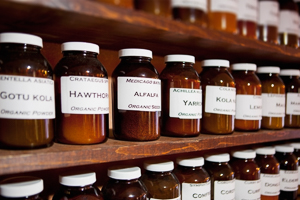Homeopathy
Topic Overview

What is homeopathy?
Homeopathy, or homeopathic medicine, is a medical philosophy and practice based on the idea that the body has the ability to heal itself. Homeopathy was founded in the late 1700s in Germany and has been widely practiced throughout Europe. Homeopathic medicine views symptoms of illness as normal responses of the body as it attempts to regain health.
Homeopathy is based on the idea that “like cures like.” That is, if a substance causes a symptom in a healthy person, giving the person a very small amount of the same substance may cure the illness. In theory, a homeopathic dose enhances the body’s normal healing and self-regulatory processes.
A homeopathic health practitioner (homeopath) uses pills or liquid mixtures (solutions) containing only a little of an active ingredient (usually a plant or mineral) for treatment of disease. These are known as highly diluted or “potentiated” substances. There isn’t strong evidence from science to show that homeopathic medicines are effective for any specific condition.
What is homeopathy used for?
Some people have used homeopathy to maintain health and treat a wide range of long-term illnesses, such as allergies, atopic dermatitis, rheumatoid arthritis, and irritable bowel syndrome. They have also used it to treat minor injuries, such as cuts and scrapes and muscle strains or sprains. Homeopathic treatment is not considered appropriate for illnesses, such as cancer, heart disease, major infections, or emergencies.
Homeopathy has been widely used in India, England, and other European countries.
Is homeopathy safe?
Homeopathic remedies have been regulated in the United States since 1938. They are thought to be safe in most cases. But some of these products may cause side effects. Others can interact with medicines that you are taking. And there isn’t any evidence to show that you can safely use homeopathic products instead of getting recommended shots or vaccines.
Some critics of homeopathy believe that there is so little active substance in a solution that any benefits from treatment are likely not because of the substance but because you are thinking it is effective (placebo effect).
It is important to tell your medical doctor if you decide to use homeopathic remedies. He or she should have full knowledge of your health to help you make wise decisions about where to purchase homeopathic dilutions and what homeopathic practitioner to see. Homeopathic remedies should not replace conventional treatments for serious health concerns.
You can buy some homeopathic medicines at health food stores without a doctor’s prescription. But preparations from different suppliers and practitioners may vary.
Talk with your doctor about any complementary health practice that you would like to try or are already using. Your doctor can help you manage your health better if he or she knows about all of your health practices.
References
Other Works Consulted
- Carlston M (2011). Homeopathy. In M Micozzi, ed., Fundamentals of Complementary and Alternative Medicine, 4th ed., pp. 343–354. St. Louis: Saunders.
- Freeman L (2009). Homeopathy: Like cures like. In L Freeman, ed., Mosby’s Complementary and Alternative Medicine: A Research-Based Approach, 3rd ed., pp. 347–363. St. Louis: Mosby Elsevier.
- Lange A (2013). Homeopathy. In JE Pizzorno, MT Murray, eds., Textbook of Natural Medicine, 4th ed., pp. 314–326. St. Louis: Mosby.
Current as of: April 9, 2019
Author: Healthwise Staff
Medical Review:Adam Husney MD – Family Medicine & Kathleen M. Fairfield MD, MPH, DrPH – Internal Medicine
Topic Contents
This information does not replace the advice of a doctor. Healthwise, Incorporated, disclaims any warranty or liability for your use of this information. Your use of this information means that you agree to the Terms of Use. Learn how we develop our content.

